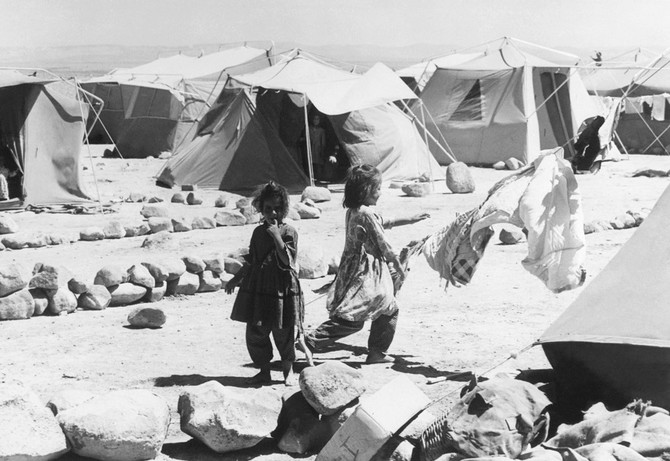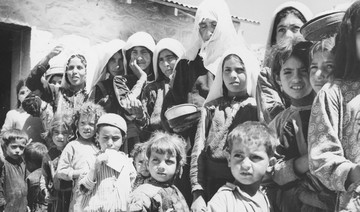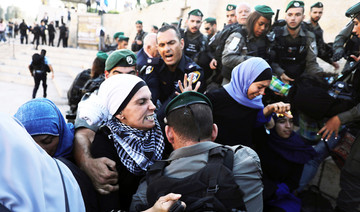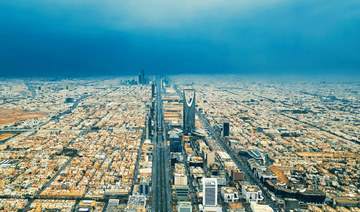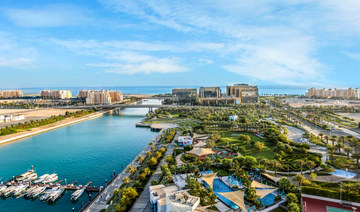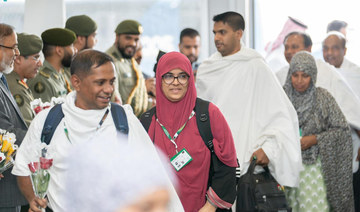JEDDAH: This June marks the 51st anniversary for Palestinian Naksa, the “setback” in Arabic. It commemorates the displacement and occupation of Arab territories that accompanied Israel’s forces’ victory in the six days war of June 1967 against Egypt, Syria, and Jordan. It ended with Israel putting up its flag over East Jerusalem, the West Bank and Gaza, Egypt’s the Sinai Peninsula and Syria’s Golan Heights.
Naksa follows Nakba, commemorating the exodus of Palestinians in 1948. The 70th anniversary of this day was marked last month.
A new wave of Palestinians poured over the Jordan River to swell UN-run camps, some already inhabited by those who were forced out in 1948. Approximately 400,000 Palestinians in the West Bank and Gaza were displaced 51 years ago this month.
Many of Gaza’s residents became refugees for the second time having been uprooted nearly 20 years previously, fleeing to Gaza after Zionist militia forces attacked Palestine villages in 1948.
While there are no official statistics on the numbers of Palestinians in the Gulf countries, due to the variety of different official documents they hold, it is estimated that the Palestinian population of Gulf countries is second only to that of Jordan.
Palestinians arrived in the Gulf in waves during different periods of history. While some were there before Nakba, numbers increased as the Palestinian diaspora expanded as the occupation stretched on.
Palestinians in the Gulf are not considered as refugees because Gulf states recognize their legal and travel documents from different countries, viewing them as the same as any other non-nationals.
Different types of displaced Palestinians live in the Gulf countries: Palestinians who have migrated from the Gaza Strip or the Palestinian coast through Egypt, many with Egyptian travel documents. Some Palestinians hold Jordanian passports, either permanent or temporary. Most of them return to Jordan from time to time, and follow the Jordanian consulates in their official transactions.
Some hold Syrian and Lebanese documents. Holders of the Syrian documents tended to regularly visit Syria before the ongoing war, while holders of the Lebanese documents have a much weaker relationship with Lebanon due to the tightened laws upon them as Palestinian refugees. However, they are an important source of income for their families in Lebanon.
Others hold European, Canadian and US passports, but came to the Gulf to raise their children in a more conservative environment than that of the West.
According to UNRWA, the United Nations Relief and Works Agency for Palestine Refugees, Palestinian refugees are defined as “persons whose normal place of residence was Palestine during the period June 1, 1946 to May 15, 1948, and who lost both home and means of livelihood as a result of the 1948 conflict.”
UNRWA services are available to all those living in its area of operations who need assistance who meet this definition and are registered with the agency, including the descendants of Palestine male refugees, and their adopted children. However, UNRWA areas of operation do not include any Gulf states, which has its both pros and cons.
Saudi Arabia hosts the largest Palestinian community in the Gulf region. Gulf states used to recruit teachers, engineers, doctors and workers from other Arab countries, many of them Palestinians.
They worked in education, health, and the oilfields. By the mid-1960s, with the opening of the Gulf markets and the expansion of oil-production capacity in the Gulf region, more came to Saudi Arabia to work.
Palestinians have contributed to the development of the education system in the Gulf region, and a number of well-known Palestinian authors worked as teachers in Saudi Arabia, producing literary works influenced by the environment they experienced in Saudi Arabia. One such is the recent Booker winner Ibrahim Nasrallah, an internationally known Palestinian poet, novelist, and professor.
Others include the former Palestinian Minister of Culture, the former Chairman of the Palestinian National Committee of Education, Culture and Science Yahya Yakhlef, and novelist Jamal Junaid.
Fadhel Humaid, a Palestinian accountant who was born in Gaza in 1945, told Arab News how he came to spend more than 45 years of his life in Jeddah, Saudi Arabia.

Refugees cross into Israeli-occupied Jordan territory, west of the Jordan River, in June 1967. Getty Images
Humaid said: “I was in Palestine during the time that Palestinians came from various parts of the country as refugees to camps such as Jabalia and Alshate’e in Gaza.” The camps received tents, food, and water from UNRWA.
“I finished my schooling in Gaza, then I went to Egypt in 1964 to study for my bachelor’s degree in accounting, as Egypt used to provide free education for Palestinians.
“During my third year at university, the 1967 war began and Israel took over Gaza and Sinai. It was miserable: We were isolated and unable to contact our families in Gaza for months. Our education was stopped.”
Four months later, students were eventually able to send radio messages to their families to reassure them that they were alive and well.
It was then that Humaid’s connection with Jeddah began. One of his brothers, who was in Jeddah, sent him a visa to the Kingdom. After that he visited Jeddah again in 1968.
“Since then I have been living in Jeddah. My last visit to Gaza was in 1973 to see my family,” he added,” I will never lose the hope of getting my homeland back.”
Abdullah Abul Loz, 28, a Palestinian who was raised in Riyadh, told Arab News: “I know my family left the occupied land and settled in Jordan’s refugee camps.
“They were originally from Bi’r Al-Sabi’ (Beersheba). In 1948, when the Israeli forces occupied the whole area, they were evacuated from their homes, and settled in Khan Younis refugee camps in the Gaza strip.
“During the Naksa in 1967, most of the family left Palestine for Jordan, and settled in the Talbieh refugee camp. Some later went to the West, others went to Gulf countries — my grandfather among them.”
His grandfather worked as a teacher in Ar Rass town in Al-Qassim province. His uncles also came to the Kingdom then.
“My grandmother has been in the Jordanian camp since 1967, and my aunts too. She told me when they went to Jordan, they got a house from UNRWA, basically a temporary area for refugees to live in.”
Talbieh camp is one of six “emergency” camps set up in 1968, 35km south of Amman, for Palestine refugees and displaced persons who left the West Bank and Gaza Strip as a result of the 1967 Arab-Israeli war.
Abdullah said he is pessimistic about the future, which he sees as “a total darkness, the only glowing element in that darkness is the occupation resistance movements.”
 Loz holds a temporary Jordanian passport, specially issued for Palestinians from Gaza.
Loz holds a temporary Jordanian passport, specially issued for Palestinians from Gaza.
Ali Nassar, 24, a Palestinian born and raised in Jeddah city, told Arab News: “My mother came to Saudi Arabia as a teacher, she joined her two brothers here who came before her and worked in a bank.
“My father joined her later and they were married here. We have been here since 1988. Most of my relatives are still in Gaza, although a few of them went to Europe.
“My father’s grandfather and his family were forced to leave his town (Salama) in Ramle subdistrict of Jaffa in 1948 to go to Gaza. They stayed in what was later known as Maghazi refugee camp there.
“My mother’s grandfather was also forced to leave his town, Zarnuqa in 1948, for the Gaza Strip. Both my parents were born and raised in Maghazi refugee camp. But my grandparents’ houses are still there in Jaffa.”
Nassar added: “I keep up-to-date by following activists in Palestine, and news agencies on social media. Sometimes I avoid following any news because it is too much for the heart to take. But my connection with the Palestinian cause is very good.
“I stay in touch by also reading about the historical and intellectual origins of the issue, and Palestinian resistance and the crimes were committed against us.”
Nassar added: “The political solutions are failing, there is public disbelief in the peace process, especially with the recent move of the US embassy to Jerusalem. Young Palestinians began to lose their confidence in politicians; that is why individual actions have been taking place in recent years.
“The future is vague, but we can see that occupation resistance is growing. We used to see protests in Gaza and Rafah, now the intifada (popular uprising) has arrived in areas such as the West Bank, and Jerusalem.”
According to Nassar, the uprising and other forms of resistance will mean Israel will lose out in the long term, as it will affect the proportion of migrants to Israel.



